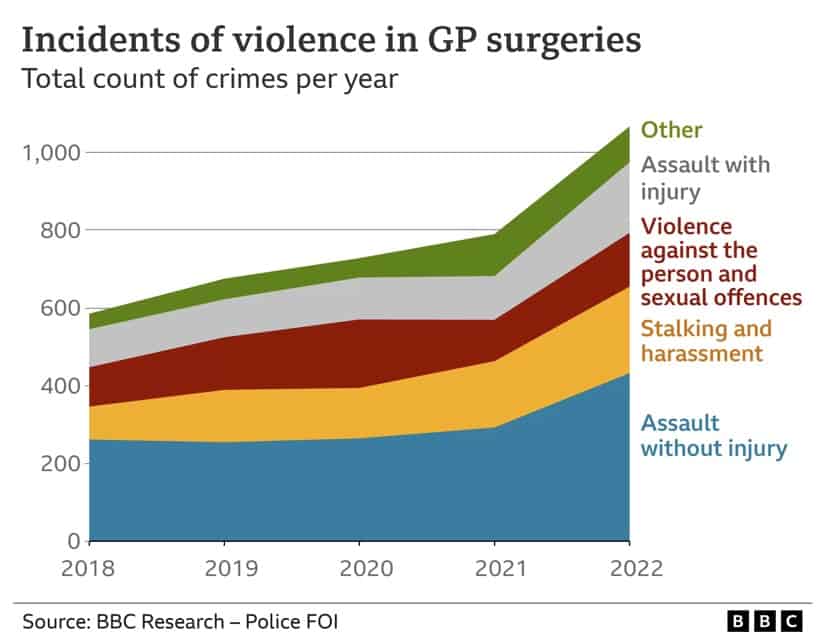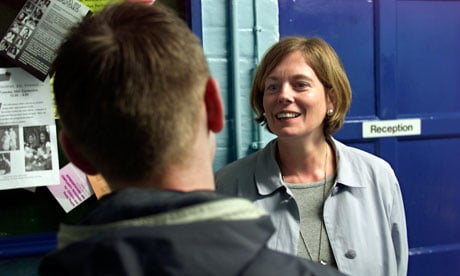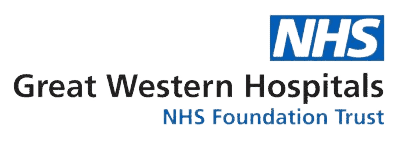

The number of violent incidents at UK general practices recorded by police forces has almost doubled in the five years to May 2022 (see this BMJ Report).
The rise in violent incidents and abuse aimed at GPs, Pharmacies and their staff is causing some to leave their jobs. “We have to try to address this because it leads to burnout of our staff, demoralisation, and staff leaving the service altogether,” said Richard Vautrey, a GP in Leeds and former chair of the BMA’s General Practitioners Committee.
“It began with a phone consultation—a patient was looking for additional medication. He got progressively more aggressive throughout the course of the conversation, and it culminated in him saying that he was coming down to the practice there and then and he was going to hurt somebody. So we locked the front door. The staff were in the reception and office area; there was only one doctor on [duty] at the time, and he was in his consulting room."
We are getting increasing aggression and abuse on phones and then also on occasion in person at the practice as well. It absolutely has an effect on our practice and staff.
GP and pharmacy leaders are finding that assaults, harassment, and other forms of abuse aimed at doctors and their staff have worsened in recent years, as services came under increased pressure. A recent survey by the medical defence organisation MDDUS found that three quarters of GPs had faced an increase in verbal abuse or aggression from patients, leading to a big rise in work related stress.
GP and Pharmacy staff are dealing with frustrated and distressed people who have high expectations or complex needs. There are often opposing views or incompatible needs, driving conflict.
The number of remote and telephone consultations has gone up dramatically, and some patients are finding that difficult to comprehend, which can then feed into the narrative of general practice and services being closed to some people. Plus there are simply fewer GPs doing more and more, so it’s no surprise that some patients are finding it difficult to access the care they need. This never excuses any kind of violence.
However, many staff will depend on on-the-job training or their natural talents to get through difficult encounters. Without expert input, reassuring them of their efforts, burnout is more likely.
The risk is that constant and repeated abuse leaves people unwilling to do the job, and we’re not then able to recruit people to replace them. That makes the problem worse because we’ve got fewer staff to be able to respond to the needs of patients, and their concerns increase, so this becomes a vicious circle.
Conflict is a complex phenomenon characterised by the experience of negative emotional reactions to perceived disagreements between two or more parties. Conflict is widely seen to be inevitable in healthcare settings. Without appropriate and timely management, conflict can result in harmful consequences for healthcare organisations (legal costs, staff costs, increased staff turnover, decreased productivity), for staff (burnout, poor team cohesion, poor well-being) and most importantly for patients (including healthcare errors, poor therapeutic relationships and worse prognosis).
Conflict management training has been shown to be effective in reducing the impact of conflict on hospitals, staff and patients/families. - link to BMJ
"If we don't tell staff what to say, we can't be surprised by what comes out of their mouths" - but many leaders wish their staff could handle conflict early and confidently, stopping escalation of situations and the need for management interventions at a later stage.
You want to stop things early before people become upset, or to deal with them when they are already upset in order to resolve the situation peacefully. Sometimes, you'll need to realise someone is in crisis and know how to work as a team, with your procedures, to keep everyone safe.
Non-Escalation - resolving everyday encounters without setting off people's triggers
De-Escalation - resolving higher-stakes encounters when people are feeling angry, upset, disappointed.
Crisis Management - knowing what to do, as a team, to keep everyone safe when people are acting dangerously.
Dynamis GP Surgery and Pharmacy Conflict Trainin,g using content from our partner Vistelar, brings together learning methodologies and training content for conflict management.
Through a range of training experiences, together we bring about these outcomes for our clients:
These training programs address the period from before an interaction begins through to the consequences of how an interaction is managed, which includes non-escalation, de- escalation, and crisis management tactics.
Most importantly, we teach how to prevent conflict from occurring in the first place.
The program emphasizes non-escalation tactics because we realized years ago that it’s always better to prevent GP Surgery and Pharmacy Conflict from occurring than to deal with its aftermath.
Example Core Scenarios - you may have a person in your workplace who is:
Using these core scenarios as examples, we lead your GP Surgery and Pharmacy Conflict learners through exercises where they must use elements of the Non-Escalation, De-Escalation and Crisis Management methods and select the appropriate strategies to meet the situation.
With the help of academic colleagues at Loughborough University, we are continually developing enhanced learning design methodology which ensures that your training budget is spent on best-value activities. Our training is therefore:

"I’d just like to take this opportunity to thank you for a first class course, both in delivery and content. The level of instruction was easy to follow, constructive and backed up by rationale, current best practice and legislation. This is definitely the ‘gold’ standard as far as I’m concerned and something as an organisation we need to aspire to."

Established in 2006, since 2017 Dynamis has been a Quality Award Centre with the Institute of Conflict Management (QAC#2201) which provides independent assessment and verification of our high Quality Assurance Standards.
Gerard O’Dea, our Director of Training, also holds the ICM Physical Skills Tutor Award (ICM L324 # 5488T) which provides independent quality assurance, evidence, verification and recognition of the award holders’ expertise, knowledge and qualifications in physical skills tuition.
Copyright - Team Dynamis Ltd